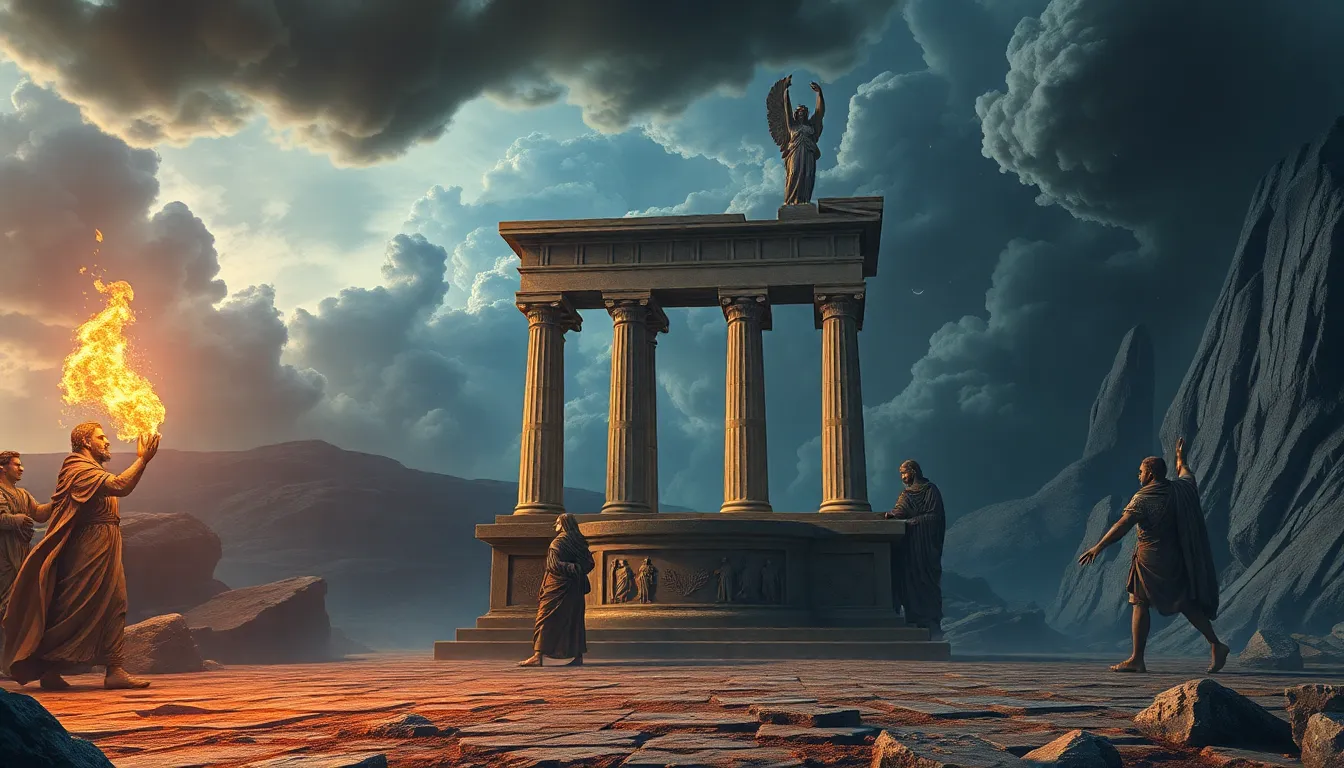The Role of Prophecy in Greek Creation Myths
I. Introduction
In the rich tapestry of Greek mythology, prophecy serves as a crucial element that intertwines fate, divine will, and human action. Prophecy, in this context, can be defined as a foretelling of future events, often delivered through oracles or seers. These messages, steeped in the mysterious workings of the gods, play a pivotal role in shaping the narratives and characters within Greek creation myths.
Greek creation myths encompass a range of stories that explain the origins of the world, the gods, and humanity. These myths not only provide insight into the ancient Greek worldview but also illustrate the complexity of human existence in relation to divine power. The importance of prophecy in these narratives cannot be overstated, as it serves to guide characters, foreshadow events, and explore themes of destiny and free will.
II. The Nature of Prophecy in Greek Mythology
Prophecy in Greek mythology can be categorized into several types:
- Divine Revelations: Direct communications from the gods, often to chosen mortals.
- Oracles: Sacred sites where priests or priestesses would interpret messages from the gods.
- Omens: Natural signs interpreted as messages regarding future events.
The relationship between gods and mortals is central to the understanding of prophetic messages. Gods often communicate their will through oracles and seers, who serve as intermediaries. This relationship underscores the idea that mortals are subject to divine influence, yet they also possess the agency to act upon or resist these prophetic messages.
Seers and prophets held significant roles in ancient Greek society, often revered for their ability to interpret the will of the gods. Figures like Tiresias, the blind prophet of Thebes, exemplify the esteemed position of seers, whose insights could alter the course of events and influence leaders.
III. Key Creation Myths Featuring Prophecy
One of the foundational texts of Greek mythology is Hesiod’s Theogony, which outlines the origins of the gods and the cosmos. Within this narrative, prophecy plays a crucial role in the unfolding of events.
One notable prophecy involves Gaia (Earth) and Ouranos (Sky), who received a foretelling regarding their offspring. This prophecy warned that one of their children would overthrow Ouranos, leading to a cycle of power struggles among the gods.
Another significant prophecy is that of Cronus, who learned from Gaia that one of his children would dethrone him. In an attempt to prevent this fate, Cronus swallowed his offspring, only to have Zeus eventually rise against him and fulfill the prophecy.
IV. The Impact of Prophecy on Character Development
Prophetic messages are instrumental in shaping the actions and motivations of key characters in Greek mythology. For instance, the knowledge of their fates can drive characters to act in ways that ultimately lead to their downfall.
The tragic consequences of ignoring or misinterpreting prophecies are vividly illustrated in the story of Oedipus. Despite receiving a dire warning about killing his father and marrying his mother, Oedipus’s attempts to evade his fate result in the very outcomes he sought to avoid.
Case studies such as Oedipus reveal the profound psychological and moral complexities associated with prophecy. The interplay of knowledge and ignorance, as well as the struggle between fate and free will, resonates throughout these narratives.
V. Prophecy as a Narrative Device
Prophecy acts as a powerful narrative device in Greek creation myths, serving to foreshadow events and drive the plot forward. By laying out future occurrences, prophecy creates suspense and engages the audience in the unfolding drama.
In many cases, the tension between fate and free will becomes a central theme of the story. Characters often grapple with their predestined paths, making choices that reflect their desires, fears, and attempts to assert control over their destinies.
This interplay of fate and free will challenges characters and readers alike, prompting reflections on the nature of existence and the role of the divine in human affairs.
VI. The Cultural Significance of Prophecy
Prophecy in Greek mythology reflects the values and beliefs of ancient Greek culture. It underscores the importance of the divine in everyday life and the belief that the gods are actively involved in human affairs.
Rituals and religious practices often incorporated prophetic elements, as individuals sought guidance from the gods through oracles, such as the Oracle of Delphi. These practices highlighted the cultural significance of prophecy and its role in shaping communal identity and moral guidance.
Moreover, the influence of prophecy extended beyond mythology into later philosophical and literary traditions, where themes of fate and destiny continued to resonate in Western thought.
VII. Comparative Analysis with Other Mythologies
When examining prophecy across different cultures, similarities and differences emerge. For example, in Mesopotamian mythology, prophecies often stem from divine decrees, while in Egyptian mythology, dreams and omens play a significant role in foretelling events.
However, Greek prophetic traditions stand out for their emphasis on the interplay of human agency and divine influence. The unique aspects of Greek prophecy, including the role of seers and oracles, provide a rich context for understanding how ancient Greeks viewed their relationship with the divine.
VIII. Conclusion
In conclusion, prophecy serves as a vital component of Greek creation myths, influencing narratives and character development while reflecting broader cultural values. The enduring legacy of these myths continues to shape modern storytelling, as themes of fate, free will, and the quest for knowledge remain relevant today.
Ultimately, the intersection of prophecy, fate, and human experience in Greek mythology invites us to explore the complexities of existence and the mysteries that lie beyond our understanding.




